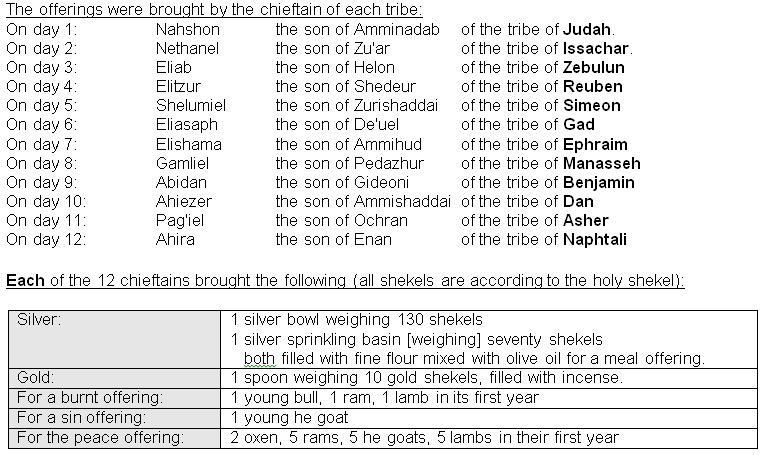Moses finishes & sanctifies the Mishkan and the chieftains of Israel present their offerings
- On the day that Moses finished erecting the Mishkan, he anointed it, sanctified it, and all its vessels, and the altar and all its vessels.
- The chieftains of Israel, the heads of their fathers' houses, presented [their offerings]. They were the leaders of the tribes. They were the ones who were present during the counting.
- They brought their offering before the Lord: 6 covered wagons and 12 oxen, a wagon for each two chieftains, and an ox for each one; they presented them in front of the Mishkan.
- The Lord spoke to Moses, saying:
Take [it] from them, and let them be used in the service of the Tent of Meeting. You shall give them to the Levites, in accordance with each man's work. So Moses took the wagons and the cattle and gave them to the Levites.- He gave 2 wagons and 4 oxen to the sons of Gershon, according to their work.
- And he gave 4 wagons and 8 oxen to the sons of Merari, according to their work under the direction of Ithamar the son of Aaron the priest.
- But to the sons of Kohath he did not give, for incumbent upon them was the work involving the holy [objects], which they were to carry on their shoulders.
- The chieftains brought [offerings for] the dedication of the altar on the day it was anointed; the chieftains presented their offerings in front of the altar. The Lord said to Moses:
One chieftain each day, shall present his offering for the dedication of the altar. 
- This was the dedication offering for the altar, after it was anointed. When Moses would come into the Tent of Meeting to speak with Him, he would hear the voice speaking to him from the two cherubim above the covering which was over the Ark of Testimony, and He spoke to him.
- according to their work Because the burden of the sons of Gershon was lighter than that of [the sons of] Merari, who carried the planks, the pillars, and the sockets.
- for incumbent upon them was the work involving the holy [objects] [I.e.,] the burden of the holy objects [such as] the ark and the table, etc. [was incumbent upon them]. Therefore “they were to carry on their shoulders” [and not in wagons].








